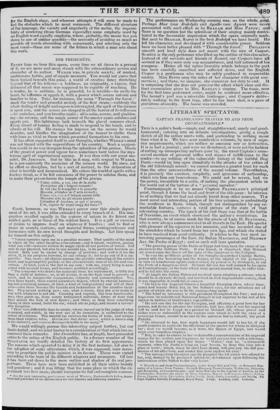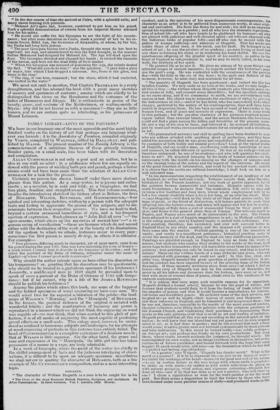CAPTAIN FRANKLAND'S TRAVELS TO AND FROM CONSTANTINOPLE.*
LITERARY SPECTATOR.
Tins is a sailor's book—simple and straightforward, manly and good- humoured ; entering into no delicate investigations, giving a rough. sketch of all the author meets with, and pretending to nothing more than what it is. We have seen numberless volumes, by men of supe- rior acquirements, which are neither so amusing nor so instructive. It is in fact a journal ; and were we ill-natured, or were not the fashion of cutting up unsuspecting authors gone by, the naval Captain's unre- served mention of personal trifles and names of indifference to the reader—to say nothing of the vulnerable history of the faithful Dog Ponti—would lay him open dreadfully to the attacks of the critics of the old Edinburgh school : we cannot conceive a greater treat for such than the utter unreservedness of the second volume. Nevertheless, it is precisely this candour, simplicity, and ignorance of authorship, which win him our benevolence. We could not be .severe, had we the poWer, irresistible to a critic, of making the pleasantest article in
the world out of the torture of a " personal narrator." • . Constantinople is by no means Captain FRANTSLAND'S principal point, though it forms the head and front of the title-page : he informs us of nothing that we had not already learnt from other sources. TLe most novel and interesting portion of his two volumes, is undoubtedly the residence in Syria, which, though not distinguished by any re- markable features, conveys a vivid picture of the state of that interesting. country. The epoch of his visit there was that of the battle of Navarino, an event which shortened the author's wanderings. In that country, he of course made for the abode of Lady H. STANHOPE, who is now always commemorated in all travels in the East. He speaks with pleasure of his sojourns in her mansion, and has recorded one of the anecdotes which he heard from her own lips, and which she stated to have received front good authority. It relates to the two most in- teresting personages of the East, the Sultan MAHMOU», and MEHMET
Am, the Pasha of Egypt ; and as such will bear quotation. - "The growing power of the Pasha of Egypt had long been the cause of un- easiness to the Sublime Porte. It was feared, at Stambool, that Mehmet Ali wotici some day throw off the yoke of the successor to the Caliphat. " In vain the perfidious policy of the Seraglio despatched Capidgi Bashis, armed with the bowstring and the dagger, to the capital of the pyramids ; in vain i:s treacherous agents endeavoured, by poison or by stratagem, to rid the Porte of a dangerous rival. Mehmet All was too well warned by his spies at Constantinople, of the toils which were spread around him, to suffer him- self to fal into the snare.
"t length the Sultan Mahmoud resolved upon adopting a scheme, which should be so cleverly devised, and involved in such impenetrable secrecy, that it was impossible it could fail of success.
" He had in the Imperial Harem a beautiful Georgian slave, whose inno- cence and beauty fitted her, in the Sultan's eyes, for the atrocious act of perfidy of which she was to be the unsuspectinr, agent. " The belief in talismans is still prevalent throughout the East ; and per- haps even the enlightened Mahmond himself is not superior to the rest of his nation in matters of traditionary superstition.
"He sert one day for the fair Georgian, and affecting a great love for her person, and desire to advance her interests, told her, that it was his imperial will to send her to Egypt, as a present to Mehmet Ali, whose power and riches were as unbounded as the regions over which he held the sway of a sovereign hince, second to no one in the universe but to himself, the great Padisha.
" He observed to her, how much happiness would fall to her lot, if she could contrive to captivate the affections of the master for whom he designed her ; that s'ae would become, as it were, the Queen of Egypt, and would reign over boundless empires.
" But, in crder to ensure to her so desirable a consummation of his imperial wishes for her welfare and happiness, he would present her with a talisman, which he then placed upon her finger. ` Watch,' said he, 'a favourable moment, when the Pasha is lying on your bosom, to drop this ring into a glass of water ; which, when he shall have drunk, will give you the full pos- session of his affections, and render him your captive for ever.'
"The unsuspecting Georgian eagerly accepted the lot which was offered to her, and, dazzled by its promised splendour, determined upon 'following the instructions of the Sultan to the very letter.
* Travels to and from Constantinople, in the Years 1827 and IS2S: or Personal Nar- rative of a Journey from Vienna; through Hungary, Transylvania, Wallachia, Bulgaria, and Roumelia, to Constantinople ; and from that city to the Capital of Austria, by the Dardanelles, 'Penedos, the plains of Troy, Smyrna, Napoli di Rumania, Athens, Egill a, I'vr(m, Cyprus, Syria, AleNandria, Malta' Sicily, Italy, Istria, Carniolia, and Styria, By Capt. Charles Colrille Frankland, Royal Navy. 2 vols. London, 1n2s. Colhurn.
"In the due course of time she arrived at Cairo, with a splendid suite, and many slaves bearing rich presents. " Mehmet Al's spies had, however, contrived to put him on his guard. Such a splendid demonstration of esteem from his Imperial Master alarmed him for his safety. "He would not suffer the fair Georgian to see the light of his counte- nance; but after some detention in Cairo, made a present of her to his in- thpate friend, Billel Aga, the Governor of Alexandria, of whom, by the bye, the Pasha had long been jealous. "The poor Georgian having lost a Pasha, thought she must do her best to captivate her Aga, and administered to him the fatal draught, in the manner Sultan Mahmoud had designed for Mehmet Ali. The Aga fell dead upon the floor. The Georgian shrieked and clapped her hands ; in rushed the eunuchs of the harem, and bore out the dead body of their master.
" When the Georgian was accused of poisoning the Aga, she calmly denied the fact. 'What did you do to him ?' was the question. 'I gave him a glass of water, into which I had dropped a talisman. See, there is the glass, and there is the ring.'
"The ring, it was true, remained ; but the stone, which it had encircled, was melted in the water."
We must not omit to mention, that Captain FRANK LAND iS a ready draughtsman, and has adorned his book Nvitil a great many sketches of scenery and specimens of costume ; among which are chiefly to be distinguished the views on the Bosphorus and the costumes of the ladies of Damascus and Aleppo. He is enthusiastic in praise of the beauty, grace, and costume of the Kelderinnen, or waiting-maids of Styria : why did he not favour us with a specimen ?—they are as little known, and we are certain quite as interesting, as his princesses of Mount Lebanon.



















 Previous page
Previous page